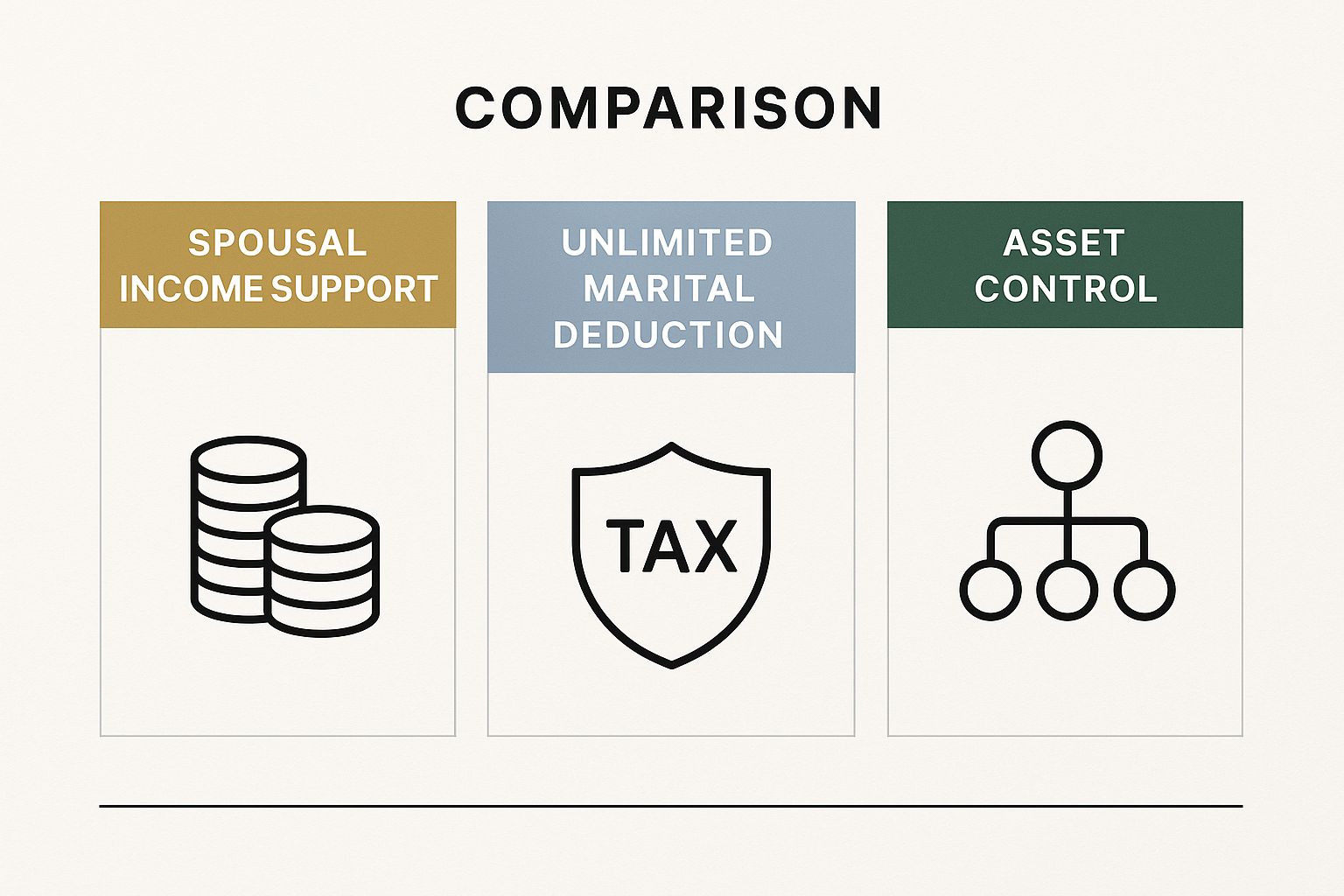Planning for your family's future after you're gone can feel overwhelming, but a marital trust is a powerful estate planning tool designed to provide for your surviving spouse while making sure your assets end up exactly where you want them to. With the right legal guidance, setting up this protection doesn't have to be a source of stress.
Think of it as building a secure financial 'house' for your spouse. They get to live in it and enjoy all the benefits for their entire life, but you get to decide who inherits the 'house' itself after they're gone.
Understanding a Marital Trust in Simple Terms
So, what is a marital trust, really? It's a special type of sub-trust that becomes active after the first spouse passes away. It's not a standalone document you draft from scratch; instead, it's a key component built into a larger estate plan, such as a will or a living trust.
The primary reason people use it is to take full advantage of the unlimited marital deduction. This is a powerful provision in federal tax law that lets one spouse transfer an unlimited amount of assets to the other without triggering any estate taxes.
This setup gives you two major wins: your surviving spouse is financially secure for the rest of their life, and you maintain control over where your assets ultimately go. This is a game-changer for blended families, where you might want to fully support your current spouse but also ensure your children from a previous marriage are the final beneficiaries.
To really understand why a marital trust is so effective at protecting assets, it helps to know a little about the fundamental principles of property law that dictate how ownership works. At its core, a trust creates a legal separation between managing assets and benefiting from them—and that’s where its real power lies.
The Key People Involved in a Texas Trust
Every trust has a cast of characters with specific roles, and knowing who's who makes the entire process much clearer. These roles are spelled out in the trust document and are governed by the Texas Trust Code, which details everyone's rights and responsibilities. The entire structure is designed to create a system of checks and balances.
For example, a trustee has what’s called a fiduciary duty—a strict legal obligation under Texas law to always act in the best interests of the beneficiaries. There are no exceptions. This principle is central to providing peace of mind to everyone involved.
Its primary job is to hold and manage assets transferred from one spouse for the benefit of the surviving spouse. The specific rules of the road are all detailed in your estate planning documents. You can get a better feel for the underlying mechanics by learning more about what a revocable trust is in Texas, which often serves as the main vehicle for a marital trust.
Here's a quick rundown of the players involved in a marital trust.
Key Roles in a Marital Trust
| Role | Description in Simple Terms |
|---|---|
| Grantor (or Settlor) | This is the person who creates the trust and puts their assets into it. In this context, it's the spouse setting up the estate plan. |
| Trustee | The person or institution (like a bank's trust department) in charge of managing the trust's assets according to the rules the grantor set. |
| Beneficiary (Spouse) | The surviving spouse. They receive income and, depending on the rules, payments from the main funds (principal) during their lifetime. |
| Remainder Beneficiaries | These are the people—often children or grandchildren—who will inherit whatever is left in the trust after the surviving spouse passes away. |
Understanding these roles is the first step to seeing how all the pieces of a marital trust fit together to protect your family and your legacy.
The Primary Benefits of a Marital Trust in Texas
Setting up a marital trust is about much more than just signing documents; it’s about creating a powerful, practical safety net for your family’s financial future, all grounded in Texas and federal law. When an experienced Texas estate planning attorney puts one together for you, it brings an incredible amount of peace of mind by tackling several big worries all at once.
Let's unpack the three core benefits that make this such an essential tool for so many married couples here in the Lone Star State.
Providing for Your Surviving Spouse
First and foremost, a marital trust makes sure your surviving spouse is taken care of financially, without interruption. Think of it as a dedicated support system. The trust holds assets specifically to generate income, which is then paid directly to your spouse, often for the rest of their life.
This structure shields them from the overwhelming stress of managing a large inheritance all on their own. Instead, they receive a reliable, steady stream of funds to cover their living expenses. You're the one who sets the rules. For instance, you can state that your spouse gets all the income the trust assets produce. You can also give the trustee—who has a strict fiduciary duty to always act in your spouse’s best interest—the authority to dip into the principal for big-ticket needs like healthcare or major home repairs. It’s all about maintaining their quality of life, just as you would have wanted.
Maximizing Tax Advantages
This is where a marital trust becomes incredibly powerful from a financial standpoint. The biggest draw for many is the ability to postpone federal estate taxes by using the unlimited marital deduction.
Under federal law, you can transfer an unlimited amount to your spouse—or into a qualifying marital trust for their benefit—without triggering a single dollar in estate tax at that moment. For example, a $20 million estate would owe absolutely zero in federal estate tax when the first spouse passes away. That tax bill gets kicked down the road, potentially for decades, allowing the assets to continue growing for the benefit of your spouse.
This infographic lays out the key benefits of a marital trust, from spousal care to tax savings and legacy protection.

As you can see, these advantages don't work in isolation. They weave together to build a secure financial foundation for your loved ones while protecting the assets you worked so hard to build.
This tax deferral is a true cornerstone of modern estate planning. It keeps more of your hard-earned money working for your spouse instead of getting siphoned off to the IRS right away. By strategically utilizing trusts for tax efficiency, you can effectively preserve your family's wealth and make sure it’s there for them long into the future.
Controlling Final Asset Distribution
A marital trust also gives you the final say over where your assets end up after your spouse is gone. This is a non-negotiable feature for blended families, or for anyone who wants to lock in their children's inheritance.
By placing assets in a marital trust, you ensure that upon your spouse's death, the remaining principal is distributed to the final beneficiaries you named—not to a new spouse or other unintended heirs.
This is your ultimate guarantee. It prevents your legacy from getting sidetracked or redirected, no matter what happens down the line. You can be incredibly generous in providing for your spouse while resting easy with the absolute certainty that your children, or other people you've chosen, will eventually receive the inheritance you always intended for them. This level of control is exactly why so many families rely on trusts for comprehensive asset protection.
Comparing Common Types of Marital Trusts
When it comes to marital trusts, one size definitely does not fit all. Think of them less like off-the-rack suits and more like custom-tailored outfits, designed to fit your family’s unique goals and dynamics perfectly.
Here in Texas, you'll generally encounter two main types of marital trusts. Each one strikes a different balance between giving your spouse flexibility and making sure your final wishes for your heirs are set in stone. Deciding which one is right for you boils down to a simple question: What do you really want to accomplish with your estate plan?
Let's break down the two primary options you'll likely discuss with a Texas estate planning attorney.
The General Power of Appointment Trust ('A' Trust)
This is what we like to call the "flexibility" trust. A General Power of Appointment Trust, or an 'A' Trust, essentially hands the reins over to your surviving spouse. They'll receive income from the trust throughout their lifetime, but more importantly, they get the final say on who inherits whatever is left when they pass away.
This "power of appointment" is a big deal. It means your spouse can name completely new beneficiaries in their own will, even if they're different from the people you originally had in mind. This trust is a fantastic choice for couples who share an unshakable trust in each other's judgment and want to empower the surviving spouse to adapt the plan as life—and the family—evolves.
The standout feature of an 'A' Trust is giving the surviving spouse the ultimate authority to direct where the assets go. It offers maximum flexibility but provides less certainty for the original creator's intended heirs.
The QTIP Trust ('B' Trust)
On the flip side, we have the Qualified Terminable Interest Property (QTIP) Trust—the "certainty" trust. With a QTIP trust, you are the one who decides, right from the start, who the final beneficiaries will be. Your surviving spouse is well taken care of, receiving all the income the trust generates for the rest of their life.
But here’s the key difference: they have no power to change the final beneficiaries you’ve already named. After your spouse is gone, the remaining assets pass directly to the people you designated—which is often the children. This structure is incredibly popular for blended families because it ensures your kids from a previous marriage get their inheritance, all while providing for your current spouse.
For a broader look at how these trusts fit into the bigger picture, it helps in understanding family trusts in Texas and the different roles they can play.

Comparing Marital Trust Options in Texas
Choosing between an 'A' Trust and a 'B' Trust is a deeply personal decision. To make it a little clearer, let's put them side-by-side. This table highlights the core differences to help you see which path aligns best with your family's situation and gives you the most peace of mind.
| Feature | General Power of Appointment ('A') Trust | QTIP ('B') Trust |
|---|---|---|
| Control Over Final Heirs | The surviving spouse decides who inherits the remaining assets. | The original grantor (creator) decides who inherits the remaining assets. |
| Flexibility | High. The plan can adapt to changing family circumstances. | Low. The final beneficiaries are locked in from the start. |
| Best For | Couples who want to give the survivor maximum control and discretion. | Blended families or those wanting to guarantee a specific inheritance for children. |
| Primary Goal | Prioritizes the surviving spouse’s future autonomy and decision-making. | Prioritizes the grantor's long-term legacy and asset protection for specific heirs. |
Ultimately, the right choice depends on your vision for the future. Do you prioritize adaptability for your spouse, or is guaranteeing your legacy for your children the most important thing? Answering that question is the first step toward building the right marital trust.
How a Marital Trust Works in a Real-World Scenario
Let's move away from dense legal jargon and look at a situation many Texas families will recognize. Sometimes, seeing how a marital trust works in the real world is the best way to grasp its power to protect the people you love.
Picture David and Sarah, a couple enjoying their life together in Houston. David has two grown children from his first marriage, while Sarah has none of her own. They've worked hard and built a comfortable life, but David has two big goals weighing on his mind: he needs to make sure Sarah is financially secure for the rest of her life, but he also wants to be certain that his assets eventually go to his children.

This is a classic blended family dilemma. A simple will just won't cut it here and could easily spark conflict down the road. If David left everything directly to Sarah, what happens if she remarries or changes her own will? His kids could be unintentionally left out. This is exactly where a sharp Texas estate planning attorney steps in with a much more elegant solution.
Crafting a Solution with a QTIP Trust
After listening to David's concerns, their attorney has the perfect tool for the job: a Qualified Terminable Interest Property (QTIP) Trust. This specific type of marital trust is tailor-made for David's goals.
Here’s a breakdown of how their attorney guides them through setting it up:
- Drafting the Trust: David creates a trust document, naming Sarah as the beneficiary for her lifetime and his two children as the "remainder" beneficiaries who will inherit what's left.
- Defining the Terms: The trust lays out the rules in plain English. Sarah gets all the income the trust's assets generate for as long as she lives. The trust can also be written to allow the trustee to dip into the principal for her health or essential needs.
- Funding the Trust: This is the key step. David formally retitles his major assets, like his investment portfolio and real estate, into the name of the trust.
- Appointing a Trustee: To keep things impartial, he appoints a professional third-party, like a bank's trust department, to manage everything. This trustee is bound by strict fiduciary duties in Texas and is legally required to act in the best interests of both Sarah and David's children.
A QTIP trust allows David to strike that perfect balance. He’s taking care of his wife for her entire life while locking in his legacy for his kids. It’s a strategy built for peace of mind.
This structure carves David's wishes in stone. When Sarah eventually passes away, the trustee's job pivots. Following the trust's instructions and the Texas Trust Code, the remaining assets are transferred directly to David's children. Sarah never had the authority to redirect those assets elsewhere, giving David the absolute certainty he was looking for.
This isn't just about legal documents; it's a compassionate and practical way to protect everyone you care about.
Key Steps to Set Up and Run a Marital Trust
Getting a marital trust off the ground and keeping it running smoothly is a journey, not a sprint. It’s a process that calls for thoughtful legal and financial planning, but taking these steps with the right advisor ensures your wishes are locked in, legally sound, and ready to provide for your loved ones for years to come. Think of it as building a strong financial house, from laying the foundation to ongoing maintenance.
https://www.youtube.com/embed/HfR7Fdjd3nM
It all starts with a clear vision of what you want to achieve. From there, every step builds on the last, creating a solid structure that works under Texas law and fits your family’s unique situation.
Trustee Responsibilities Under Texas Law
Once the person who created the trust passes away, the trust "wakes up," and the trustee's job begins. This is not a set-it-and-forget-it role. It comes with serious legal responsibilities known as fiduciary duties in Texas.
The trustee is the guardian of the trust and has to wear many hats. Their core duties include:
- Managing Assets Prudently: This means investing and protecting the trust's property like a careful, responsible professional, all according to Texas law.
- Distributing Income and Principal: Making payments to the surviving spouse exactly as the trust document instructs.
- Keeping Detailed Records: Tracking every single dollar that comes in or goes out. Meticulous records are a must.
- Filing Taxes: The trust is its own entity, so it needs its own tax returns filed each year.
- Communicating with Beneficiaries: Keeping everyone in the loop and reasonably informed about what's happening with the trust.
Because the ongoing duties are so demanding, many families opt for professional trust management. This ensures all the legal and financial boxes are ticked and helps keep the peace between family members. At the end of the day, a trustee must act with total loyalty, always putting the beneficiaries' interests first.
Step-by-Step Guidance for Trust Administration
Navigating the trust administration process requires careful attention to detail. Here is practical, step-by-step guidance for trustees in Texas:
- Consult an Attorney: Your first move should be to meet with an experienced Texas trust administration lawyer. They will help you understand the trust document and your legal obligations under the Texas Trust Code.
- Gather and Secure Assets: Locate all assets owned by the trust. This includes retitling assets that were not properly funded and securing real estate, bank accounts, and investment portfolios.
- Notify Beneficiaries: Texas law requires you to provide notice to all beneficiaries. Clear and timely communication can prevent future trust disputes.
- Manage and Invest: You must manage the trust's assets prudently. This may involve working with financial advisors to create an investment strategy that aligns with the trust's goals.
- Pay Debts and Expenses: Use trust funds to pay any of the deceased's final debts, as well as ongoing administrative expenses like legal fees and taxes.
- Distribute Assets and Income: Follow the trust's instructions precisely when distributing income to the surviving spouse and, eventually, the final principal to the remainder beneficiaries.
- File Tax Returns: Work with an accountant to file annual income tax returns for the trust and the final estate tax return if necessary.
Got Questions About Marital Trusts? We've Got Answers.
When you start digging into the details of something like a marital trust, it’s only natural for questions to pop up. Getting clear, straightforward answers is what helps Texas families like yours move forward with confidence. Here are some of the most common things people ask us.
What Happens to the Trust Assets When the Surviving Spouse Dies?
Once the surviving spouse passes away, the trustee’s job pivots to carrying out the final wishes of the person who created the trust in the first place. They will gather the remaining assets and distribute them to the final beneficiaries named in the original trust document.
This is a really important feature, especially for a QTIP trust, because it makes sure the grantor's legacy is honored exactly as they planned. The assets don't just become part of the surviving spouse's estate to be handed down to their heirs—unless, of course, the trust was a General Power of Appointment trust designed to allow that.
When to Modify or Terminate a Trust
Whether you can change a marital trust really hinges on how it was set up from the get-go. If the trust is part of a revocable living trust, the creator is free to make changes anytime while they're alive. But once the creator passes away, that trust usually becomes irrevocable, and its terms are set in stone.
While tweaking an irrevocable trust is tough, it's not always impossible. Texas law does have a few narrow exceptions that allow for changes, but it involves a complex court process. It's absolutely critical to talk to a Texas trust administration lawyer to see if this is even a remote possibility for your situation. Trying to figure out how to modify a trust in Texas on your own can lead to serious legal headaches and potential trust disputes.
Is the Income from a Marital Trust Taxable?
Yes, it is. Any income the trust generates and distributes to the surviving spouse is generally considered taxable income for them. The trust itself is its own legal entity, so it has to file its own tax return.
The trustee handles that filing and will give the surviving spouse a tax form called a Schedule K-1. The spouse then uses that K-1 to report the trust income on their personal tax return. It's important to remember that it's typically the income that's taxed, not the principal assets themselves when they're distributed.
Who Can I Pick to Be a Trustee in Texas?
You've got options here in Texas. You could appoint someone you trust implicitly, like a highly responsible family member, or you could go with a corporate trustee—think a bank or a professional trust company.
The biggest thing to consider is choosing someone who can handle the strict fiduciary duties in Texas laid out in the Texas Trust Code. They need to be organized, impartial, and financially savvy. Honestly, a professional trustee is often a great choice to guarantee expert management and sidestep potential family drama, especially if you have significant assets or a blended family. A skilled Texas estate planning attorney can help you weigh the pros and cons to find the right fit for your family.
If you’re managing a trust or planning your estate, contact The Law Office of Bryan Fagan, PLLC for a free consultation. Our attorneys provide trusted, Texas-based guidance for every step of the process. You can reach us at https://texastrustadministration.com.







